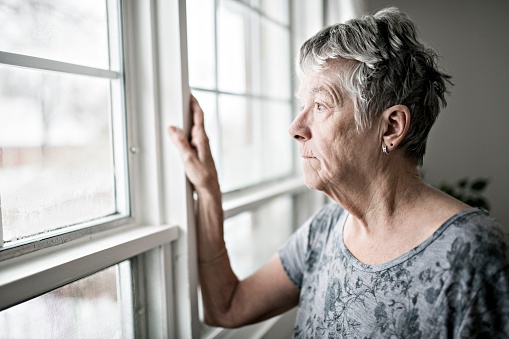
A study shows how the COVID-19 pandemic has augmented loneliness among older women in the U.S. The results were published in the Journals of Gerontology.
The study of more than 27,400 Women’s Health Initiative (WHI) participants ranging in age from 71 to 104 shows that loneliness increased among women when measured during the early months of the pandemic compared to when they were surveyed a few years before the pandemic began. This increase in loneliness and loss of social connections — which the research team called a “silent epidemic” — has resulted in worsening mental health.
The study consisted of more than 27,400 Women’s Health Initiative (WHI) participants ranging in age from 71 to 104 (average age, 83). Researchers collated data from WHI participants who completed surveys, which included a scaled-down version of the UCLA Loneliness Scale, from 2014-16 and between February and October 2020. The researchers observed that prior to the COVID-19 pandemic, more than 40% of Americans 60 and older were lonely, with women expressing more loneliness than men. This WHI study was able to use survey data collected pre-COVID from the same women in the early months after the pandemic spread across the United States. Overall, the WHI dataset was comprised of one of the largest and most diverse cohorts of older women available.
shows that loneliness increased among women when measured during the early months of the pandemic compared to when they were surveyed a few years before the pandemic began. This increase in loneliness and loss of social connections — which the research team called a “silent epidemic” — has resulted in worsening mental health.
How did the Pandemic Impact Women of Color?
Interestingly, older women of color appeared less impacted by COVID in terms of loneliness – particularly Black and Asian/Pacific Islander women – these groups reported decreases in loneliness during the pandemic compared to before. But why is that? Researchers surmise that this is attributable to women of color having more social connections and support available compared to White women – who are more likely to have limited social contact and be childless.
Other factors the study found improved loneliness scores were drinking alcohol in moderation, increased physical activity, and having a positive outlook.
“We are only beginning to understand the many ways the pandemic has impacted our health, including emotional health and well-being. The elderly may especially feel a sense of loneliness and isolation. The longer-term effects of loneliness remain to be understood,” said study co-author Jean Wactawski-Wende, PhD, SUNY Distinguished Professor and dean of the School of Public Health and Health Professions at UB via a press release.







 © 2025 Mashup Media, LLC, a Formedics Property. All Rights Reserved.
© 2025 Mashup Media, LLC, a Formedics Property. All Rights Reserved.